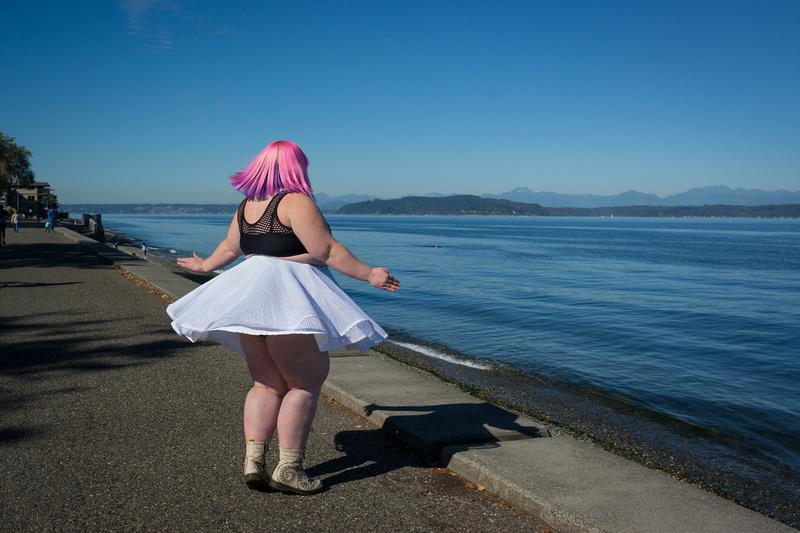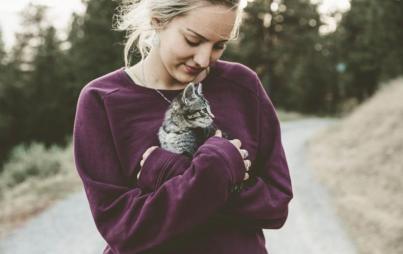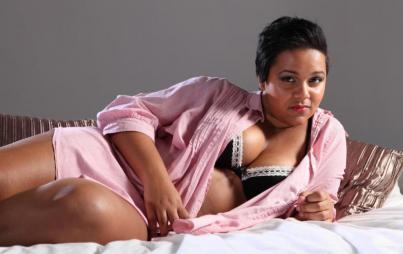
"Some fat women never risk movement at all because of shame and fear of ridicule."
That little blue bicycle with the banana seat was an extension of my body and soul. I rode around the big empty hospital office building early in the morning, hands never on the handlebars. I’d work up speed and then take my feet from the pedals, waving my arms, circus style, switching side-saddle or putting my feet up on the handle bars for kicks. I never wiped out. No pain, no scabs, no scars. Never. I once spent a quarter in one of those machines where a mystery gift pops out in a plastic bubble. It turned out to be a sticker with a funny little blue faerie-devil and the words “Blue Imp” on it. I stuck it on the front of my bicycle at the helm. I was in 4th grade – eight years old. I rode around as often as I could, no friends around the apartment where we lived waiting for our house to be remodeled. My father left us during that remodel, so it was a long wait.
I was nimble on the Blue Imp, not too heavy at all.
My sugar addiction was already in full bloom, fueled by my mother’s disgust at watching me eat it, and at me being fat. She’d reluctantly buy me a milkshake with my burger at the fast food joints where we often dined and say, “It’s like poison.” Or “I wish you wouldn’t eat that.” Sometimes I rode my bike down to the donut shop, further than I was actually allowed to go on the big busy street. I’d buy however many donuts I could with change I found around the house. I wasn’t afraid of that street. I was nimble on the Blue Imp, not too heavy at all.
♦♦♦
I am watching a group of kids, probably 8-15 years old, playing on a pier. Two of them have climbed up onto a large broken metal and wood structure; perhaps it had been a small billboard. Their parents would probably yell for them to come down if they were looking. Eight boys and two girls, shoving each other and playing. The two boys up on the structure look down and jeer, daring.
The older girl – maybe fourteen – makes for the structure. She is a formidable climber in her white shorts and halter top. Her lean brown body seems unconcerned with decorum and appearances. I marvel at her physical problem-solving. When she approaches, the two boys are already high atop the wooden whatsit; she sets about figuring out how to climb it. They laugh at her failed attempts, and then she figures it out. Part climbing, part jumping from pole to structure. She stands tall and triumphant, the trio some 20 feet above the pier — 60 feet at least above the water below. The other kids look on impressed as they joke and push at each other, standing on the solid wooden planks.
I am watching from a rented kayak, bobbing in the water near the shore. I am also impressed by the girl on the high-up structure – because of the climbing and because she’s a girl. She has more to overcome on that climb than the boys, so it’s all the more courageous that she does it. It’d be easy to say that she’s just overcoming stereotypes, and those are mental, so climb away! But stereotypes and expectations are carried in the body. They become ability or failure in the eyes of others unevenly. She clearly has moxie. Try and retry through the jeers moxie.
I remind myself that this body deserves my constant reclamation from the social sea that would sooner see it drowned.
By the time I was her age, I was more timid than the smaller girl who stands on the pier at a distance from the climbing triumph. I no longer rode a bike, found the world strangely cruel and beautiful, and my body – well, I hadn’t rejected it as some girls had, but I lived cautiously, having embraced the story that a fat body was rather weak and socially useless. In private, intimate moments, I knew my body was a miracle. Looking up from my kayak, bobbing gently in the sea, I recall the joy of a trustworthy body and how I would re-discover my own athleticism in my 20s, 30’s, then lose it again in my late 40’s.
Close to 50 now, the feeling of the kayak being an extension of my body — as the Blue Imp was - eludes me. I stay close to shore and enjoy the bob and sway as others head to deeper waters. I feel shaky and scared when confronted by swells or chop, and I fear falling out and not being able to get back in, my body a spectacle as I struggle. The boat is an extension of my body, of course, so the more I wobble in fear, the more the boat threatens to tip. I work to level my breathing. Relax my shoulders, enjoy and stretch my current abilities. I remind myself that this body deserves my constant reclamation from the social sea that would sooner see it drowned.
As I watched the young woman in shorts and halter top, her slim body trying to ascend, turning back, ascending again, her body awkwardly wedged and then free in her repeated attempts, I realized that much of the decorum bodies like mine feel is the result of stigma management. Sure, she looks more awkward than lady-like, her butt sticking out at times, her arms quivering with effort; her sweaty, capable movements carry their own social stigma related to femininity. But my body is a spectacle even when I am sitting still, and stillness — full containment of movement — is the only thing that diminishes public ridicule.
It’s a cruel set-up, the way thin people cajole us toward exercise, to lose weight "for our own good." The fat body in movement is a travesty – even when amazingly powerful, fat female weightlifters, shot putters, and discus throwers are derided for the way their fat arms protrude from t-shirt sleeves. The way the belly becomes visible in a moment of twisting is considered reprehensible.
I am keenly aware that one might say to a thin girl: “Pull down your shirt; it’s riding up.” Whereas one would say to a fat girl: “Pull down your shirt; your belly is showing.” Both are body-policing commentary and yet very different in intent. The first statement speaks to the shame of revealing the female body, the dangers of potential assault that girls are made to carry. The second speaks of the shame of revealment plus the shame of ugliness.
The second statement contains the first, along with the shame of being wrong-bodied and likely deserving manifold abuses. If such a body were to be assaulted, specifically sexually assaulted, the body whose belly is deemed un-see-able should also feel a bit grateful for the attention.
Pull your shirt down. It’s riding up.
Pull your shirt down. Your belly is showing.
Clothing necessarily moves around the body in movement. When the body is in motion, exerting itself, engaged in physical problem-solving, it becomes visible. The difference between the shirt riding up and the belly showing can be the difference between acceptance and ridicule, life and death.
I am fearful and floating and losing my calm and finding it again and enjoying my small triumph of being in a kayak at all.
It would be easy to say that I accomplished physical fitness in my youth by “not caring” what other people were thinking of my body. In part, it’s true. I had to come into the experience of my body, rather than focusing on the appearance of my body in order to go all-in at the gym, in the dance class, in the yoga studio. And at the same time, I was always aware of my body’s appearance. How could I not be in such a world? Physical mastery of every task was needed in order to keep me showing up. Otherwise, the burden of insults and pity would have simply been too great.
In my youth, when people opened their mouths to speak about my body, it was to say I was graceful (for a fat woman) or strong (for a fat woman). Sure, the parenthetical was always there, but being impressive comes first. That’s stigma management. While wearing exercise clothes was itself radical, I was still constantly thinking about the clothes, choosing what to show and what to conceal. Some days still, my ability to bare my upper arms in a yoga class, for instance, is a challenge. The ability to bare my belly publicly, most days, is still beyond me.
Some fat women never risk movement at all because of shame and fear of ridicule. There is logic in this choice. Tragic (often invisible) logic.
What I see in the girl’s body, high above the water, is pleasure and triumph. I remember the way breeze feels on skin on a hot day. I am grateful for what her joy teaches me, and for the movement of the sea beneath me as I watch her. I am fearful and floating and losing my calm and finding it again and enjoying my small triumph of being in a kayak at all. This is an act of reclamation. The last time, ten years ago, I was with a group and became too fearful to keep up in choppy water. I turned back to shore and felt failure, not pleasure. Today, I am afraid and grateful and the sun is shining; everything glistens.
Just yesterday, at this very beach, I took up a conversation with a fat woman on the shore. She was sitting in the sand, the water lapping up over her legs as I ambled into the water. Of course I noticed her, the bikini in particular, because she was a fat woman about my size, and I quite enjoy noting how many young fat women are now wearing bikinis at the beach.
Once in the water, I floated easily, then paddled about. I could feel her watching me as I dug my feet into the soft sand, picked up shells and examined them as I jounced along. One of us struck up a conversation about the beauty of the shore or the weather – who knows; we were both affable conversationalists. She said she was afraid of the water and though she was staying by the shore for the summer, she never went in. She was from Wisconsin. I marveled at her bathing-suit and travel bravery – alone on a summer-long adventure, juxtaposed against her swimming timidity. She hadn’t been in the water once.
I grew up in fear. I was probably nine years old when I realized that I was likely the weight of an adult woman. In any case, I wasn’t the size of a child, so I became aware that most “child-things” were not for me. Always admonished for not exercising more, always insulted in movement, this is how we grow. At Sea World, during a school trip, I self-consciously noted that the weight limit on one of the playable attractions was 110 pounds. I already weighed near 130. I imagined the attraction tearing apart under the weight of my body. I imagined falling through it, or worse yet, being the reason that other children fell through it. I imagined ridicule. Sometimes, I imagined that something would go terribly wrong as a result of my body and I wouldn’t even deserve to be rescued. I’d actually die, with others laughing at me in pity and disgust.
The young woman watched me for quite a while in the nearly currentless water. And then she said, “It looks so lovely. Maybe I won’t be swept out.” I imagined her imaginings — her lifeless body being pulled to shore and dragged, no further poise in her flesh, onlookers laughing. I saw the way she looked at the sea, worried, and I imagined her fear, smiled, and invited her in.
I am staying with myself, my own breath, aware that my too-small life jacket draws attention to my body.
Soon, she was floating beside me. Though it wasn’t likely that any ill would befall us there in the soothing sea, fear and anticipatory shame can so easily excise us from the company of others, leave us tribeless. How much easier was it for that young woman to have another fat lady around, I pondered? Or maybe I simply understood how much easier it would’ve been for the younger aspect of myself — always calculating the possibility of disaster with no one like me doing the bold thing, the daring thing. There was hardly ever anyone like me doing anything physical at all. Comrades remind us how pleasure and triumph look in bodies like our own.
When the choice comes to let the fat body be seen in struggle or be still, most will choose stillness.
♦♦♦
The girl in the white halter top and shorts breathes heavily for a few moments high above the pier, arms akimbo, feet planted firmly, resting after her ascent. She is my role model for today; she has reminded me of my relationship with the Blue Imp. She and the two boys start to wrestle then, each trying to knock the others off the platform into the water. She identifies with them and their laughing cries make them kindred. Somehow, we are all connected for just a moment, in body pleasure, water-air-sun-sea pleasure. We are earth-bound human-community-creating animals.
I am bobbing along in my kayak, wobbling with the fear that was inscribed upon my body long ago. I am staying with myself, my own breath, aware that my too-small life jacket draws attention to my body. I am breathing and smiling and squinting up at them. I am not letting my belly show as I watch her joyful scuffle and the way her shirt rides up again as they all fall-jump at once, push apart, each body separate, limbs stretched like stars mid-air, contracting into spears as they pierce the glistening water.








